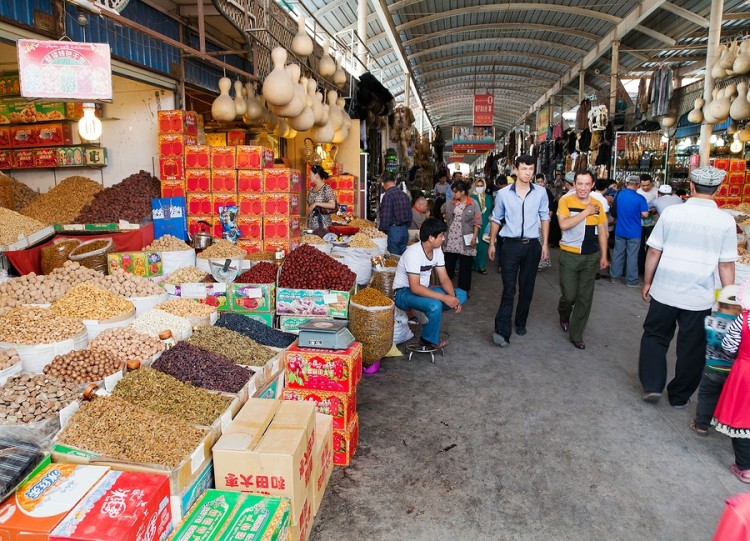Funds Seen Driving China Commodity Trade Boom Defying Slowdown

©2015 Bloomberg News
NOKM5S6KLVR7
(Bloomberg) — Chinese hedge funds are helping drive a commodity derivatives trading boom in the world’s biggest energy, grains and metals consumer that’s defying the worst economic growth in 25 years.
Trading volumes across on the Shanghai Futures Exchange, China’s biggest commodities bourse, surged 31 percent last year while activity on exchanges in Zhengzhou and Dalian grew by 29 and 10 percent, respectively. The expansion, compared with a 3.5 percent increase on the London Metal Exchange, is being driven by a growing number of investment funds nurtured by new regulations, according to Hu Yuyue, a professor at Beijing Technology and Business University.
“A registration is all you need to go out and raise money for your private equity or hedge funds,” said Hu, who studies futures markets. “It really opened a floodgate and therefore we saw an explosive growth in these institutional investors. They are increasingly corporate, professional and sophisticated.”
The surge in commodity trading contrasts with slowing physical demand. As the IMF predicts economic expansion will cool this year to 6.8 percent, China’s growth in oil, copper and steel consumption is forecast to decelerate. That’s not deterring hedge funds, which boosted the number of investment products across all markets by more than one-third last year.
China vies for the top spot as the world’s biggest oil importer and gold consumer and is the largest user of industrial metals and iron ore. The Bloomberg Commodity Index of 23 raw materials has gained 0.7 percent this year after a 17 percent slump in 2014 as oversupplies were met with weakening demand from China.
Price Influence
Changes since 2013 to fund regulations, as well as new commodity futures contracts and a push to internationalize the yuan, dovetail with government efforts to ensure China’s influence on commodity prices matches its significance as an importer and consumer.
Trading across all contracts on the Shanghai Futures Exchange grew to 842 million lots last year, while the Dalian Commodity Exchange expanded to 770 million trades and the Zhengzhou Commodity Exchange increased to 676 million, according to data from the Futures Industry Association. The London Metal Exchange, the world’s largest metals bourse, rose to 177 million.
Contracts for the same commodity can vary in size depending on the exchange. Copper trades in 25-ton lots on the LME, while it’s five tons on the SHFE.
Government ‘Blessing’
“The exchanges and the regulators gradually eased the restrictions of trading activities,” said Cai Luoyi, deputy general manager of Shanghai Cifco Futures Co. “The traders are allowed to do more on the market, so we should not be surprised by rising volumes.”
New rules by the China Securities Regulatory Commission in 2013 and its Asset Management Association of China unit last year have spurred the growth by helping accelerate fundraising. The number of investment products provided by private Chinese funds rose nearly 35 percent in 2014 to 3,825, following a 30 percent gain the year before, according to data from Z-Ben Advisors, a Shanghai-based research company.
“Investor awareness is greater, as well as how safe they feel investing into private funds.” said Alexis He, an analyst at Z-Ben. “The other part is market perception. This is because registration will increase transparency, but also because it signaled the government’s ‘blessing’ on the industry.”
There were 6,174 hedge funds in China managing 873 billion yuan ($141 billion) at the end of April, according to Hong Lei, vice chairman and Communist Party secretary at the Asset Management Association of China.
Opening Up
“The growth of hedge funds in China is very rapid and their strategies are becoming more mature,” Hong said at a conference in Hangzhou on May 16.
Trading by Chinese companies may increase beyond its borders. The State-owned Assets Supervision and Administration Commission, which oversees government-owned enterprises, issued a notice April 21 allowing the companies more autonomy over commodities derivatives trading overseas.
Hong Kong Exchanges & Clearing Ltd., owner of the LME, is trying to tap the expansion in derivatives trading with its own contracts. The bourse is hosting an annual industry gathering this week in Hong Kong.
“China is also taking more — and faster — steps to open up,” Charles Li, chief executive officer of Hong Kong Exchanges & Clearing, said in a May 14 statement, referring to the SASAC decision.
More Jobs
The growth of funds and trading in China is luring analysts from brokers and banks. Roger Yuan, jumped to hedge fund Shanghai Chaos Investment Co. earlier this year from his job as a commodity analyst at Goldman Sachs Group Inc.
“Many people are moving to the buy side from the sell side with the expansion of domestic funds,” Yuan said. “The development of the fund industry in China in recent years offered greater opportunities. More funds mean more jobs.”
–With assistance from Martin Ritchie and Bei Hu in Hong Kong and Jasmine Ng in Singapore.
To contact Bloomberg News staff for this story: Alfred Cang in Shanghai at acang@bloomberg.net; Feiwen Rong in Beijing at frong2@bloomberg.net To contact the editors responsible for this story: Ramsey Al-Rikabi at ralrikabi@bloomberg.net







No Comment